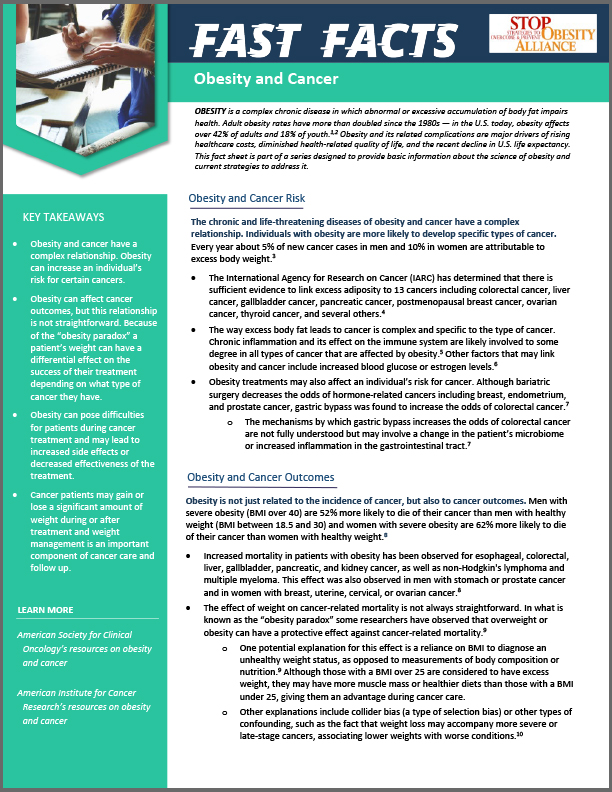Download: Fast Facts - Obesity and Cancer (PDF)
OBESITY is a complex chronic disease in which abnormal or excessive accumulation of body fat impairs health. Adult obesity rates have more than doubled since the 1980s — in the U.S. today, obesity affects over 42% of adults and 18% of youth.1,2 Obesity and its related complications are major drivers of rising healthcare costs, diminished health-related quality of life, and the recent decline in U.S. life expectancy. This fact sheet is part of a series designed to provide basic information about the science of obesity and current strategies to address it.
Key Takeaways
-
Obesity can affect cancer outcomes, but this relationship is not straightforward. Because of the “obesity paradox” a patient’s weight can have a differential effect on the success of their treatment depending on what type of cancer they have.
-
Obesity can pose difficulties for patients during cancer treatment and may lead to increased side effects or decreased effectiveness of the treatment.
-
Cancer patients may gain or lose a significant amount of weight during or after treatment and weight management is an important component of cancer care and follow up.
Obesity and Cancer Risk
The chronic and life-threatening diseases of obesity and cancer have a complex relationship. Individuals with obesity are more likely to develop specific types of cancer. Every year about 5% of new cancer cases in men and 10% in women are attributable to excess body weight.3
- The International Agency for Research on Cancer (IARC) has determined that there is sufficient evidence to link excess adiposity to 13 cancers including colorectal cancer, liver cancer, gallbladder cancer, pancreatic cancer, postmenopausal breast cancer, ovarian cancer, thyroid cancer, and several others.4
- The way excess body fat leads to cancer is complex and specific to the type of cancer. Chronic inflammation and its effect on the immune system are likely involved to some degree in all types of cancer that are affected by obesity.5 Other factors that may link obesity and cancer include increased blood glucose or estrogen levels.6
- Obesity treatments may also affect an individual’s risk for cancer. Although bariatric surgery decreases the odds of hormone-related cancers including breast, endometrium, and prostate cancer, gastric bypass was found to increase the odds of colorectal cancer.7
- The mechanisms by which gastric bypass increases the odds of colorectal cancer are not fully understood but may involve a change in the patient’s microbiome or increased inflammation in the gastrointestinal tract.7
Obesity and Cancer Outcomes
Obesity is not just related to the incidence of cancer, but also to cancer outcomes. Men with severe obesity (BMI over 40) are 52% more likely to die of their cancer than men with healthy weight (BMI between 18.5 and 30 ) and women with severe obesity are 62% more likely to die of their cancer than women with healthy weight.8
- Increased mortality in patients with obesity has been observed for esophageal, colorectal, liver, gallbladder, pancreatic, and kidney cancer, as well as non-Hodgkin's lymphoma and multiple myeloma. This effect was also observed in men with stomach or prostate cancer and in women with breast, uterine, cervical, or ovarian cancer.8 The effect of weight on cancer-related mortality is not always straightforward. In what is known as the “obesity paradox” some researchers have observed that overweight or obesity can have a protective effect against cancer-related mortality.9
- One potential explanation for this effect is a reliance on BMI to diagnose an unhealthy weight status, as opposed to measurements of body composition or nutrition.9 Although those with a BMI over 25 are considered to have excess weight, they may have more muscle mass or healthier diets than those with a BMI under 25, giving them an advantage during cancer care.
- Other explanations include collider bias (a type of selection bias) or other types of confounding, such as the fact that weight loss may accompany more severe or late-stage cancers, associating lower weights with worse conditions.10
Obesity During Cancer Treatment
Regardless of whether a patient’s obesity has contributed to the cause of their cancer, it can have a profound effect on their treatment. From diagnostic testing to surgical interventions, a person’s body weight can affect the accessibility of certain treatments and the outcomes of those treatments.
Radiographic Imaging
Imaging tables and machines may have a weight limit beyond which they cannot safely function. It may take longer to scan patients with obesity, exposing them to a larger dose of radiation.11
Chemotherapy
A lack of sufficient weight-based chemotherapy dosing information may contribute to undertreatment and increased cancer mortality in patients with obesity.13 Additionally, chemotherapy drugs absorbed by body fat may be less effective in patients with excess adiposity.14
Radiation Therapy
Radiation therapy equipment may have a weight or body diameter limit. Patients with obesity are more likely to experience acute dermatitis and slowed healing post-treatment.12
Surgery
Patients with obesity are more likely to experience adverse events like blood loss, infection, or lymphedema. Patients with sleep apnea are at greater risk of respiratory complications when under anesthesia.12,15
Weight Management during Treatment and Survivorship
Cancer patients may gain or lose significant amounts of weight during or after their cancer treatment. The American Society for Clinical Oncology recommends that oncologists take an active role in addressing weight with their patients.16
- Physical activity is an important weight management tool for cancer survivors but may be difficult due to the late effects of cancer treatment. Pain, anxiety, fatigue, lack of stamina, and treatment side effects are among the barriers to exercise most commonly found in cancer survivors.17,18
- Eating a nutritious diet may be difficult for cancer patients who receive chemotherapy. Many patients undergoing chemotherapy experience malnutrition and weight loss during treatment as a result of nausea, vomiting, or loss of appetite.19
- References
-
- Hales CM, Carroll MD, Fryar CD, Ogden CL. Prevalence of obesity and severe obesity among adults: United States, 2017–2018. NCHS Data Brief, no 360. Hyattsville, MD: National Center for Health Statistics. 2020.
- Hales CM, Carroll MD, Fryar CD, Ogden CL. Prevalence of obesity among adults and youth: United States, 2015–2016. 2017.
- Islami F, Goding Sauer A, Gapstur SM, Jemal A. Proportion of cancer cases attributable to excess body weight by US state, 2011-2015. JAMA Oncol. 2019;5(3):384-392. doi: 10.1001/jamaoncol.2018.5639 [doi].
- Lauby-Secretan B, Scoccianti C, Loomis D, Grosse Y, Bianchini F, Straif K. Body fatness and cancer — viewpoint of the IARC working group. N Engl J Med. 2016;375(8):794-798. doi: 10.1056/NEJMsr1606602.
- Kolb R, Sutterwala FS, Zhang W. Obesity and cancer: Inflammation bridges the two. Current Opinion in Pharmacology. 2016;29:77-89. doi: https://doi.org/10.1016/j.coph.2016.07.005.
- Wolin KY, Carson K, Colditz GA. Obesity and cancer. Oncologist. 2010;15(6):556-565. doi: 10.1634/theoncologist.2009-0285 [doi].
- Mackenzie H, Markar SR, Askari A, et al. Obesity surgery and risk of cancer. Br J Surg. 2018;105(12):1650-1657. doi: 10.1002/bjs.10914 [doi].
- Calle EE, Rodriguez C, Walker-Thurmond K, Thun MJ. Overweight, obesity, and mortality from cancer in a prospectively studied cohort of U.S. adults. N Engl J Med. 2003;348(17):1625-1638. doi: 10.1056/NEJMoa021423.
- Strulov Shachar S, Williams GR. The obesity paradox in Cancer—Moving beyond BMI. Cancer Epidemiol Biomarkers Prev. 2017;26(1):13. doi: 10.1158/1055-9965.EPI-16-0439.
- Sperrin M, Candlish J, Badrick E, Renehan A, Buchan I. Collider Bias Is Only a Partial Explanation for the Obesity Paradox. Epidemiology. 2016;27(4):525-530.
doi:10.1097/EDE.0000000000000493 - Uppot RN, Sahani DV, Hahn PF, Gervais D, Mueller PR. Impact of obesity on medical imaging and image-guided intervention. Am J Roentgenol. 2007;188(2):433-440. doi: 10.2214/AJR.06.0409.
- 14. Ross KH, Gogineni K, Subhedar PD, Lin JY, McCullough LE. Obesity and cancer treatment efficacy: Existing challenges and opportunities. Cancer. 2019;125(10):1588-1592. doi:
10.1002/cncr.31976 - Griggs JJ, Mangu PB, Anderson H, et al. Appropriate chemotherapy dosing for obese adult patients with cancer: American society of clinical oncology clinical practice guideline. JCO.
2012;30(13):1553-1561. doi: 10.1200/JCO.2011.39.9436. - Desmedt C, Fornili M, Clatot F, et al. Differential benefit of adjuvant docetaxel-based chemotherapy in patients with early breast cancer according to baseline body mass index. JCO.
2020:JCO.19.01771. doi: 10.1200/JCO.19.01771. - Neligan PJ. Metabolic syndrome: Anesthesia for morbid obesity. Current Opinion in Anesthesiology. 2010;23(3):375-383.
- Ligibel JA, Alfano CM, Courneya KS, et al. American society of clinical oncology position statement on obesity and cancer. JCO. 2014;32(31):3568-3574. doi: 10.1200/JCO.2014.58.4680.
- Cox CL, Montgomery M, Oeffinger KC, et al. Promoting physical activity in childhood cancer survivors. Cancer. 2009;115(3):642-654. doi: 10.1002/cncr.24043.
- Courneya KS, Friedenreich CM, Quinney HA, et al. A longitudinal study of exercise barriers in colorectal cancer survivors participating in a randomized controlled trial. Annals of Behavioral Medicine. 2005;29(2):147-153.
- Sánchez-Lara K, Ugalde-Morales E, Motola-Kuba D, Green D. Gastrointestinal symptoms and weight loss in cancer patients receiving chemotherapy. Br J Nutr. 2013;109(5):894-897. doi: 10.1017/S0007114512002073.
A product of the Strategies to Overcome & Prevent (STOP) Obesity Alliance at the Sumner M. Redstone Global Center for Prevention & Wellness.







